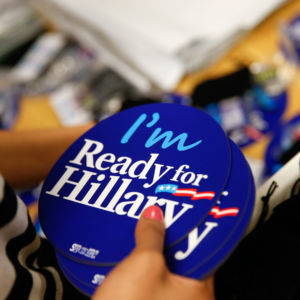Democratic nominee Hillary Clinton gained significant support among national unions during the primaries but she was likely going to win regardless of their help.
Clinton officially accepted the nomination July 28 to mixed reception from many within her own party. Some union members believe that labor leadership betrayed them by backing her over primary rival Sen. Bernie Sanders. Nevertheless Clinton was likely to win even if unions overwhelmingly endorsed Sanders.
“Its certainly influential in terms of media coverage and financial contributions so those types of endorsements are certainly sought after heavily by the campaigns,” University of Michigan Political Expert Aaron Kall told InsideSources. “[It] wouldn’t have been large enough to make an overall difference at the end of the race.”
Sanders made issues important to the labor movement a cornerstone of his campaign. He was able to win support from many local unions and a few national ones, as well. Nevertheless, Clinton was the overall favorite when it came to national union support.
“I think its undeniable that unions have a large amount of influence on the Democratic side,” Center For Responsive Politics Researcher Robert Maguire told InsideSources. “I don’t think you could possibly say that if all of the unions had come out in force for Bernie from the get-go that that could have had a significant effect on the outcome of the primaries.”
Maguire primarily focuses on the impact of campaign contributions to political influence. Labor unions are some of the most generous. But Maguire notes that union contributions have steadily decreased since the presidential election of 2008.
“What we’re seeing is still a large amount of financial support on the Democratic side from unions, and Democrats depend on that union support,” Maguire also noted. “On the flip side, though, we also see a lot less direct spending from unions in support of candidates.”
Unions might have also just backed Clinton because it looked to be a safe choice. Despite Sanders performing better than many would have ever expected, Clinton was the likely nominee from the moment she entered the race.
“You always want to back the winning candidacy and that’s where the smart money is on politically, especially if you’re going to assume she’ll win both the primary and the general,” Kall went onto say. “Trying to curry favor with that early in the process is important.”
Unions are also essential to those they endorse for their ability to rally and mobilize volunteers. Maguire adds that its important not to downplay the political influence unions wield but rather understand they’re simply one powerful group among several.
“They’re something that is very important to the Democratic party and they do have influence within the Democratic party, but they’re one of several players,” Maguire stated. “Even with the sway unions have within the Democratic party, I don’t think any candidate would be able to win with just support from the unions.”
Demos Policy Analyst Sean McElwee notes, however, the real issue is how the party is structured. Democratic party leadership appeared to be backing Clinton from the very beginning. Labor unions and all other loosely associated groups may have just been following what the party was already doing.
“The fact that unions endorsed Clinton is largely because of their close ties to the Democratic Party,” McElwee told InsideSources. “Would Bernie have won the primary with union endorsements? Maybe, but you have to change fundamentally both union strategy and the strategy Bernie used for his campaign.”

